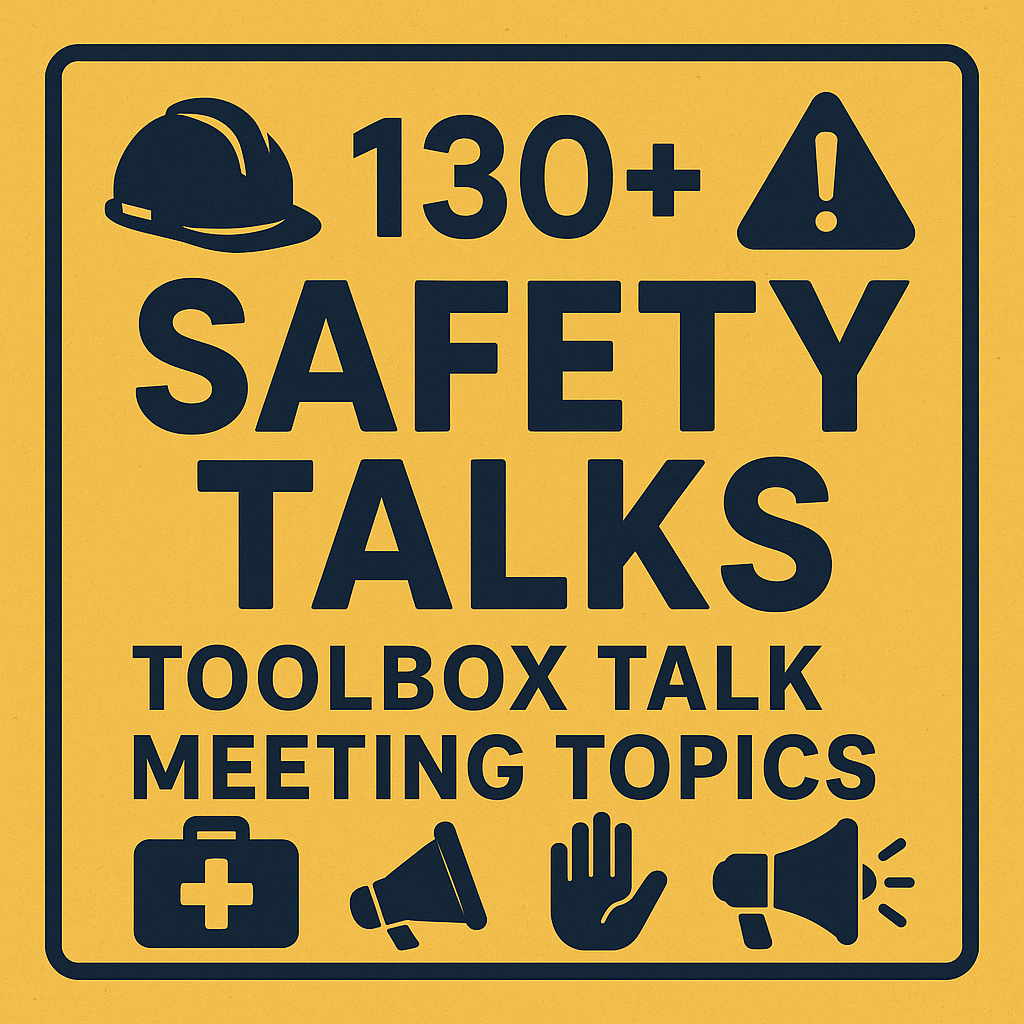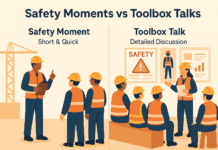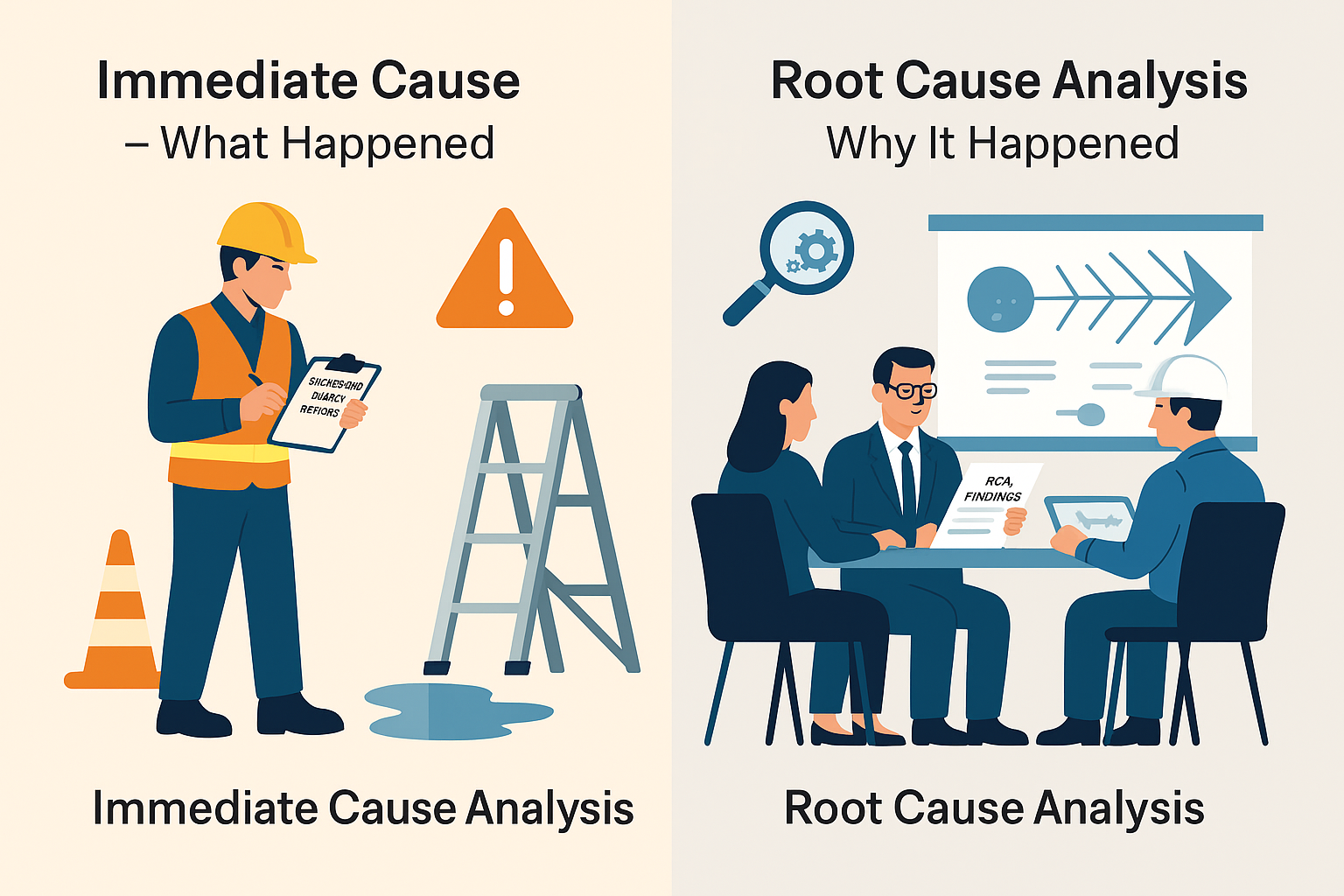
130+ Safety Talks and Toolbox Talk Meeting Topics
Safety talks, also known as toolbox talks or safety briefings, are short meetings focused on a specific safety topic relevant to the workplace. These talks are essential in keeping your team informed, aware, and motivated to follow safety protocols.
Whether you’re a safety officer, supervisor, or team leader, having a list of ready-to-go topics can save time and improve the consistency of your safety meetings. That’s why we’ve compiled 130+ practical toolbox talk topics you can use across various industries.
Benefits of Regular Safety Talks
Reducing Accidents
By addressing risks proactively, toolbox talks help prevent injuries and unsafe behavior.
Promoting a Safety Culture
When safety is discussed daily, it becomes a part of the work culture—not just a checklist item.
Refreshing Knowledge
These talks serve as mini-training sessions that reinforce safety practices without overwhelming workers.
How to Use This List of Topics
- Schedule daily or weekly safety talks.
- Pick topics relevant to your current job phase.
- Customize based on the season, incident trends, or specific site hazards.
- Keep the sessions informal, interactive, and brief.
General Safety Topics (20+)
- Basic PPE Requirements
- Importance of Housekeeping
- Slip, Trip & Fall Prevention
- How to Report Unsafe Conditions
- Safe Use of Fire Extinguishers
- Emergency Exit Familiarization
- Handling Sharp Objects
- Awareness During Walking and Working Surfaces
- Job Hazard Analysis (JHA)
- Toolbox Talk Purpose and Importance
- Use of Safety Signage
- Daily Safety Checklists
- Safe Storage of Tools
- Awareness of Co-Workers’ Safety
- Safety Rules for New Employees
- Communication in Emergencies
- Personal Hygiene at Work
- Injury Reporting Procedures
- Identifying Unsafe Acts
- Ladder Use on General Sites
Construction Safety Topics (25+)
- Working at Heights
- Scaffold Tagging System
- Ladder Inspection & Use
- Excavation Hazards
- Barricading Excavated Areas
- Electrical Safety in Construction
- Hot Work Permits
- Rebar Caps and Protection
- Fall Arrest Systems
- Manual Handling on Site
- Formwork Safety
- Use of Hand Tools
- Power Tool Safety
- Crane Signal Communication
- Overhead Work Precautions
- Repetitive Motion Hazards
- Dust and Silica Exposure
- Concrete Vibrator Hazards
- Welding Safety on Site
- Site Induction Essentials
- Vehicle Movement Safety
- Tag Out and Signage on Equipment
- Traffic Management Plans
- Trenching and Shoring
- Pre-Task Safety Briefings
Electrical Safety Topics (15+)
- Basic Electrical Awareness
- Lockout/Tagout Procedures
- Arc Flash Risk
- Extension Cord Safety
- Safe Handling of Live Wires
- Ground Fault Circuit Interrupters
- Overhead Line Safety
- Battery Charging Safety
- Electrical Panel Safety
- Temporary Electrical Installations
- Power Tool Electrical Checks
- Insulation and Isolation Awareness
- Underground Cable Identification
- Wet Conditions and Electricity
- Safe Use of Power Generators
Chemical Safety Topics (10+)
- Chemical Spill Response
- Using MSDS/SDS Sheets
- Labelling Hazardous Substances
- PPE for Chemical Handling
- Flammable Liquid Storage
- Corrosive Substance Awareness
- Ventilation in Chemical Areas
- Toxic Gas Awareness (H2S, etc.)
- Acid-Alkali Neutralization Procedure
- Eyewash Station Use
Equipment & Mechanical Safety Topics (10+)
- Machine Guarding Essentials
- Forklift Operator Safety
- Power Tool Daily Checks
- Equipment Lockout Scenarios
- Safety with Compressors
- Lifting Equipment Inspection
- Conveyor Belt Awareness
- Safety with Hydraulic Systems
- Grinder Safety
- Equipment Shutdown Protocol
Health and Hygiene Safety (10+)
- Hand Hygiene in the Workplace
- Heatstroke Recognition and First Aid
- Working in Cold Conditions
- Sun Protection at Work
- Eye Protection Importance
- Hearing Protection in Noisy Areas
- Ergonomic Injury Prevention
- Importance of Stretching
- COVID-19 Protocols
- Sick Leave Awareness
Behavioral and Mental Safety Topics (10+)
- Human Error & Safety
- Positive Safety Behavior
- Mental Health at Work
- Managing Work Stress
- Psychological Safety Culture
- Recognizing Fatigue
- Avoiding Distractions
- Encouraging Team Accountability
- Peer Safety Coaching
- Anger and Conflict Control
Office & Ergonomic Safety Topics (10+)
- Posture Correction Tips
- Safe Use of Office Equipment
- Fire Exit Knowledge in Offices
- Trip Hazards in Workspaces
- Eye Strain Prevention
- Safe Lifting in Admin Tasks
- Office Electrical Safety
- Workstation Adjustment Guide
- Handling Paper Cuts & Minor Injuries
- Avoiding Overcrowded Work Areas
Environmental Safety Topics (10+)
- Water Conservation Tips
- Energy-Saving Habits
- Pollution Prevention Techniques
- Waste Disposal Segregation
- Spill Containment Measures
- Noise Pollution Control
- Eco-Friendly Chemical Usage
- Recycling Awareness
- Air Quality Control
- Sustainability in Safety
Emergency and Seasonal Safety (10+)
- Fire Drill Best Practices
- Earthquake Preparedness
- Flood Safety Awareness
- Shelter-in-Place Protocol
- Emergency Contact List
- Holiday Season Electrical Safety
- Firework Use Guidelines
- Monsoon-Related Site Risks
- Winter Gear and Clothing
- Summer Heat Illness Prevention
Toolbox Talk Delivery Tips
- Keep it simple, use visuals if possible
- Focus on 1 topic per session
- Encourage workers to share experiences
- End with a safety quiz or Q&A
- Document attendance and topic
Conclusion
Toolbox talks are not just routine—they are life-saving conversations. By delivering regular safety meetings using these 130+ topics, you’re creating a more informed, alert, and prepared workforce. Pick the ones relevant to your work, rotate them, and always keep the team engaged!
5 Minute Safety Talk on Work at Height
5 Minute Safety Talk on Personal Protective Equipment (PPE)
Top 15 Toolbox Talk Topics for Construction Safety Officer
Top 25 Safety Moments to Promote a Culture of Safety at Work
20 Short Safety Moments for Meetings (5-Minute Discussions)
FAQs
Q1: How long should a toolbox talk last?
5 to 10 minutes is ideal to keep attention and impact high.
Q2: How often should toolbox talks be conducted?
Daily on high-risk jobs, or weekly in standard environments.
Q3: Can toolbox talks be repeated?
Yes, especially if a recent incident or seasonal hazard demands it.
Q4: Who should conduct toolbox talks?
Safety officers, supervisors, or trained team leaders.
Q5: Do toolbox talks need to be documented?
Yes. Always record the topic, date, presenter, and attendee signatures.
























